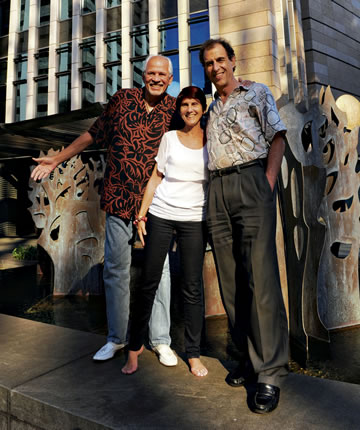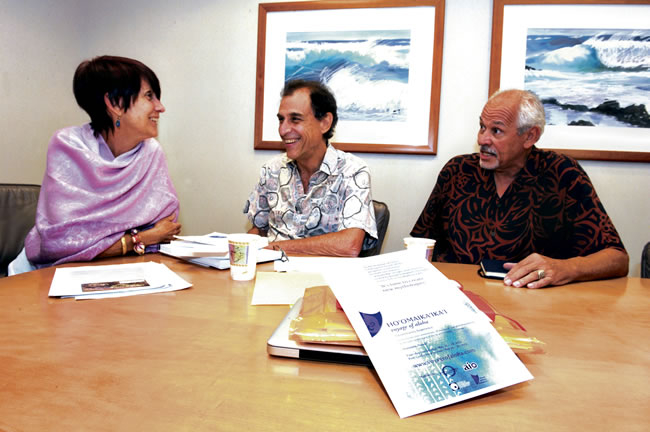Emphasizing Our Interconnectivity
A conference later this month brings together an eclectic mix of speakers on faith, science, business and public service
Elizabeth Revley believes that when you boil down cultural and religious beliefs to their very essence, you come away with a universal truth – that we are all connected, that we come from a single source, and that to live a good life we all need to be in service of others. The co-producer and director, along with Roger Epstein, of Ho’omaika’ika’i, Voyage of Aloha, is bringing together an eclectic mix of speakers for a four-day conference on faith, science, business and public service.
Elizabeth Revley, Roger Epstein and Dwight O'Neill
Much of the seminar is based on the work of Joseph Campbell, a writer and lecturer who is perhaps most widely known for his work in comparative mythology and religion that led to his theory of interconnectivity among people.
“We are all connected, and we are connected by this one universal power,” says Revley. “If we were to pick one thing from this, it’s understanding that we are all connected and then living from that place of connection. Science calls it quarks, and different religions have different names for it, but we are doing both the science piece and the faith piece.”
In addition to Campbell’s work, the conference also will share the vision of Rinaldo Brutoco, the founder of the World Business Academy, who will speak about the need for businesses to be more conscious of their effect on the planet and society.
Call it new age doctrine, combined theology or ethical absolutism. Revley says labels don’t matter, it’s the message that’s important.
“It’s really important to our sustainability as a planet to become collaborative, to work together creatively, and to act in that way that all religions tell, which is that we are all connected, and to live a good life is to be in service.”
As often as she speaks about religion – including the idea that the conference came from an understanding of common religious beliefs – Revley points out that this is a nonreligious event.
If people find a religious connection to the information being presented and shared, that’s fine.
If not, that’s OK, too, because the main purpose of the conference is to create a collaborative experience on which the organization will build for future events.
“This conference is five-and 10-years’ long. It is an ongoing conversation about how each of us becomes more sustainable, and how we can live by our principles of being connected, being in service to one another, being collaborative. This is an ongoing learning process for everybody. It’s about how to be caretakers of the aloha spirit, how to send aloha around the world.”
Future events will occur locally and online, weekly or monthly, or in other ways recommended by attendees.
To provide a specific Hawaiian aspect to the conference, organizers have invited M. Kauila Clark, a traditional educator and a member of the board of directors of the Waianae Coast Comprehensive Health Center. Among other topics, Clark will help lead discussions on native Hawaiian spirituality and the power of aloha. He also will lead a sunrise service on the beach May 26.
Other speakers include Dr. Elisabet Sahtouris, a biologist, author, futurist and former MIT professor; Sister Joan Chatfield, a Maryknoll sister and executive director of the Institute for Religion and Social Change; Duane Preble, professor emeritus of art at UH-Manoa, and Robert Walker, the executive director and board president of the Joseph Campbell Foundation.
The conference runs May 25-28 at the Pagoda Hotel.
Tickets for the conference cost $295 for kamaaina. Admission to both the conference and retreat is $695.
For more information, and a complete list of speakers, go to voyageofaloha.com.







